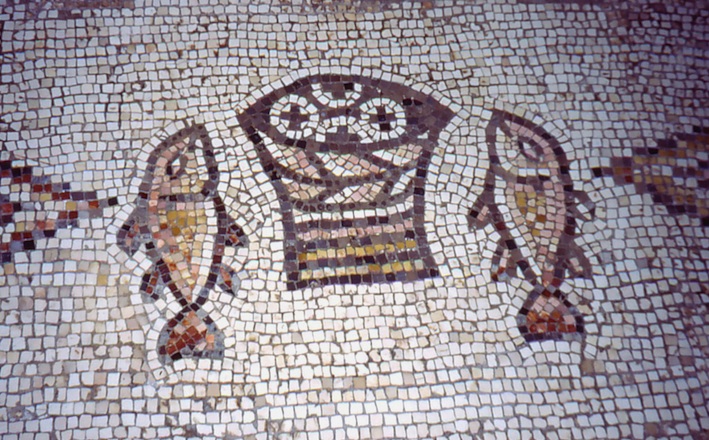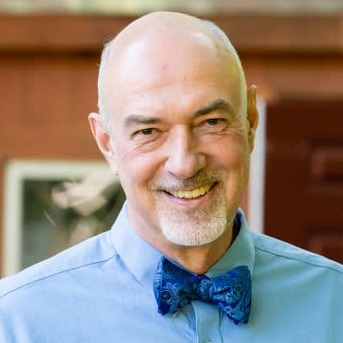Commentary on Matthew 14:13-33
In Matthew 14, Jesus’ exercise of divine power is set in contrast with the corrupt, violent, and fear-inducing power of Herod Antipas.
Jesus’ power not only surpasses that of Herod; it is, more importantly, a different kind of power with different outcomes. Both Herod and Jesus host lavish banquets, but one is an exercise in the murderous debauchery of human rulers, the other in gentle care for hungry masses in the wilderness. The disciples are the primary audience for this study in contrasts, which is meant to blow open their strait-jacketed imaginations. In these stories, Jesus is democratizing divine power.
After the death of John, Jesus flees Herod, but the crowds follow him. Despite traveling on foot, they are waiting for Jesus when his boat arrives on the other side of the sea. He responds with “compassion” and healing. Brief accounts of Jesus’ power to heal, in fact, frame the two stories in this lesson (Matthew 14:14, 34-36). Both stories take place in the evening or night, and away from the towns where Jesus has been ministering. Away from the human symbols and activities that order and define daily perspectives and practices, the crowds and the disciples have an opportunity to perceive reality in new ways.
Matthew uses the temporal marker “evening” in accompaniment with manifestations of God’s power (see 8:16-17, 14:15, 14:23). For the disciples, however, an evening in the wilderness is a problem. They usually don’t offer Jesus advice, but here, focusing precisely on the late hour and the wilderness location (14:15), they tell Jesus to “send the crowds away so that they may go into the villages and buy food for themselves.” Their advice may seem prudent, but their perspective is resolutely human. They are thinking more in terms of scarcity and self-interest than of the abundance of God’s empire.
Sending the crowds home means sending them back into the oppressive and alienating economic realities of Galilee. Scarcity, hunger, alienation, and fear are symptoms of unjust political, social, and economic arrangements. That’s why the crowds have followed Jesus into the wilderness, but the disciples have drug that world with them. Our presuppositions of scarcity and the need to secure our own economic well-being locate us with the disciples in this story.
Jesus sees things differently: “They need not go away; you give them something to eat.” Here, in a deserted place as night falls, the economic and social realities of the Roman Empire and Galilee do not hold. Jesus has already given his disciples power to cast out unclean spirits, heal, raise the dead, and proclaim God’s reign, even when they are vulnerable (Matthew 10:1-10). Now he holds them accountable for the responsible exercise of that power. They remind him that they have nothing but “five loaves and two fish,” precious little even for them, but more than enough in the empire of heaven.
Jesus’ actions — taking the loaves and fish, looking up into heaven, blessing God, and breaking the loaves, giving them to the disciples — anticipate the Last Supper (Matthew 26:26). In both instances the disciples are drawn in as participants in the new order God is establishing in the world. There are even enough leftovers for the disciples themselves, and symbolically for the twelve tribes of Israel. Matthew repeats this same scenario again in 15:32-38, but in Gentile territory, suggesting that there is enough for the nations, too.
Jesus’ divine power is again on full display when Jesus walks on the sea. Matthew alone adds the account of Peter joining Jesus outside the boat, thereby challenging our assumptions about the boundaries between the human and the divine. Images of divine presence and power riddle this story. Again, the temporal marker “evening” (14:23) suggests another moment of divine manifestation. While Jesus prays alone on a mountain, a storm of demonic proportions “batters” the disciples’ boat in the middle of the sea. The term “batter” or “torment” is usually found in stories of possession (8:6, 8:29). Sea, storm, and nighttime all convey a sense of chaos and threat.
During the darkest hours of the night, about the same time that God delivered Israel through the sea from Pharaoh (Exodus 14:24), Jesus comes to them on the wild sea. Only God walks on the sea (Psalm 77.19, Job 9.8, Isaiah 43.16). The disciples cry of terror is a typical response when humans encounter God. Jesus’ words of reply, “take heart” and “have no fear” accompany healings and theophanies elsewhere in Matthew (9:2, 7:7, 28:5, 28:10). The middle clause, “It is I,” conveys reassurance, but the words literally are “I am,” the Greek rendering of God’s name. God is here in the storm.
Only Matthew tells us that Peter joins Jesus on the water. When Peter recognizes Jesus, he seems to wonder whether, if Jesus can walk on water, he can, too. Jesus immediately approves Peter’s request to make the attempt, which indicates that Jesus does not regard Peter’s request as inappropriate. Apparently, the exercise of divine power is not limited to Jesus. So, Peter climbs out and walks to Jesus. But when he “sees the wind,” his human imagination once again exerts itself. After Jesus reaches out to save him, a gesture often found in healings (8:3, 8:15; 9:18, 9:25), he chides Peter for his “little faith” and doubt.
“Little-faith” here describes Peter’s failure of nerve, not impulsivity. “Doubt,” used only here and in Matthew 28:17, where the disciples first encounter the resurrected Jesus, carries the sense of “standing in two places” or “being of two minds.” Peter fails when his human perceptions of reality overwhelm his perception of divine power. As the story concludes, the disciples worship Jesus (as in 28:17) and, for the first time, confess that he is “Son of God.”
God’s power is loose in the world, but is utterly unlike the power of human empires. Faith involves changing our minds — our imagination of reality — and entails crossing boundaries. This is still the heart of Christian practice in times of violence, scarcity, and alienation.
PRAYER OF THE DAY
Generous God, you helped your son Jesus feed 5,000 hungry people who had gathered to hear of your love. Help us provide for the needs of all who hunger for your word. We pray these things in the name of Jesus Christ, our Savior and Lord. Amen
HYMNS
My life flows on in endless song ELW 763
Wade in the water ELW 459/trad.
Break now the bread of life ELW 515
CHORAL
As Jesus fed the five thousand, L. Gruenis


February 24, 2019